Kalai rutis, tamarind trees, and childhood adventures
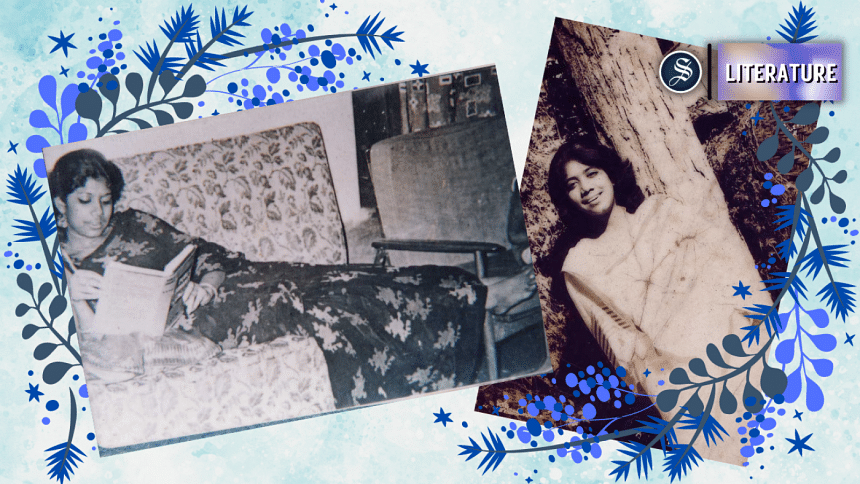
My father was transferred to a border station in Rajshahi called Godagari when I was eight or nine. This town was a known redoubt of snakes. They were so innumerable here that it was a common sight to see men and women walk down the village road while snakes also slithered along side by side. The animals were focused on their own concerns and paid no mind to the people, who sometimes loudly clapped their hands to ensure that the truce was maintained, apparently unaware that snakes have no sense of hearing.
My sister Beauty and I would roam about Godagari. She was five years younger than me and got into all sorts of adventures, including one day when we found some palm fruits that had fallen from the trees. These fruits take root on the ground and inside its seed grows a sweet kernel. To get at it one must cut it with a heavy dao. That day my sister held the seed in her hand while I foolishly swung down with dao. Unfortunately, I missed and left my sister with a deep wound on one finger. The scar this wound persists and my sister likes to remind me of it when she sees me still.
Our large family posed challenges for my mother when she had to give us snacks as there were nine of us in total. Once my mother gave Beauty and I two bananas to eat and cautioned us to tell no one, likely because she didn't have enough for everybody. Beauty went around telling everyone that she was given a banana but was not supposed to talk about it.
When we would go to sleep my siblings and I would tickle each other's backs, counting from one to hundred. The understanding was that we had to reciprocate. If I tickled someone's back they would have to do the same. I would always make my sister do it first, I promised to do it in turn. My siblings would not believe me as I had a shaky reputation for keeping my promises. So they would make me swear on the Koran. I would swear and then they would tickle me and I would inevitably fall asleep and not tickle their backs. When held accountable the next time I would say that I swore on the 'Oran' and not the 'Koran', so there was no sin against God.
Beauty and I shared a bed and frequently fought as to who would get to keep the kol balish. Eventually, I offered a solution: that I would keep it until midnight, following which it would pass to my sister's possession. She agreed to this not realising that she would never be able to rise before midnight and claim that which was her due. This way, the pillow was always mine.
Sometimes, while my sister slept beside me, I would look out from the second story window into the dark night because I had heard that frogs and snakes carried precious gems on their heads to light their way at night. One night when I saw a blue light in the jungle I watched it make its way through the woods. Then, as it was passing just below my window I dropped a bowl on it hoping that it would trap the frog or snake and I would finally get its gem. But the next morning when I ran out excitedly I found the bowl upwards, facing the sky. There was no frog, no snake and certainly no gems.
There was a patch of kash ban behind our house that would sway in the wind and look evocative, beckoning you to come and explore its mysteries. One afternoon my mother and I went into it to wallow in its beauty when suddenly two animals appeared before us, apparently as startled by us as were by them. The two pairs, humans and animals stood staring at each other until my mother compelled me to run away. Later she told me she thought they were wolves.
Godagari was a remote area, and the home allotted to my father was the worst one I had lived in in my short life. It was a red brick, two storey house with small cramped rooms. There were no nearby schools, so my studies were limited to a half or a full hour with my father. Since I was the eldest child it followed that if I were not attending school neither would my younger siblings. I would study by the dim light of candles, lamps or a hurricane lantern. For a pen I used a piece of wood with a nib stuck on it. I would dip it into a vial of ink that had to be made by dissolving 'ink tablets' into water.
I ate wonderfully while at Godagari. I was obsessed with a flatbread made of a mix of lentil and rice flour called kalai ruti while in Godagari. It was a staple food of the poor in the area and normally eaten with a chutney of onions and red chillies. I found kalai ruti irresistible. I wouldn't get tired of it even if I ate it every day. I still remember its taste to this day, and whenever I meet someone from the region of Rajshahi I ask them if they would make it for me.
You could also get delicious bundia in Godagari, delicious bubbles of sweetness that came in red, yellow and green colours. The region was famous for its mangoes. My father bought me one once when the train we were travelling in stopped at Amnora station. It was sweet and tart and so big that even holding it with two hands and with my great appetite I could not finish it.
There was a swing in the front yard of our house that hung from a large tamarind tree. I would play there while my younger brother Kamal would explore the environs. Oddly, during these explorations he often carried a small pair of scissors with him. My mother felt relieved if I spent time just near that swing so that she could keep an eye on me, but when she wasn't looking, I would often venture into the forest that was just by our house. The large trees of the forest were densely enmeshed that the sunlight could hardly make it through the thick canopy.
It was in that forest that I once met a young woman. She was about twenty years old. She was dark-skinned, which was discriminated against at that time and not considered desirable but she had beautiful features. She also wore a big golden nose pin. I recognised that she was a woman called pagli by the villagers because she was not sound mentally. But through our regular concourse in the woods a friendship developed between us. We engaged in long discussions on matters that seemed to be of great import at the time but which I now cannot remember. I liked her nose pin and wanted it for myself. But when I asked her for it she refused. Mad or not, she knew the value of gold.
It was in Godagari that I developed a large stye on my eyelid that would not go away on its own. A doctor came to operate on it and then returned every few days to change the dressing and note the progress of the healing.
As Godagari was at the border my father was responsible for catching smugglers. Low quality cigarettes would come in from India while eggs and fresh milk would go over from the East Pakistan side. When my father caught the smugglers he would say you're sending them amrita in exchange for poison.
Cigarettes were popular in Godagari as all the people had to smoke there were biris. In fact, many of the poor in Godagari subsisted by making biris in makeshift factories that were little more than a place for people to sit and make biris with simple ingredients. Men and women would sit side by side and make a whole pile of biris while sitting on cane mats. They would use a small sharp stick to close the upper and lower parts of the tobacco leaf after stuffing it with tobacco dust. On each biri maker's lap were flat baskets containing leaves, dust, the sticks and reels of thread. They were paid by the number of biris they produced.
I was a regular visitor to this 'factory'. I would sit for hours and watch the women making biris. Desperate to emulate them, I would beg them from time to time to let me make one. Sometimes they would indulge me.
Going to the biri factory made things very difficult for my father's orderly as he had to look for me all over town. Eventually when he would find me at the biri factory he would tell me that my parents were very angry and escort me home. On the way he would tell me how tired he was of looking for me all over town every day.
Other times I would not even be at the biri factory, rather at the homes of strangers where I had ended up during my wanderings. On one occasion I went into a stranger's home and convinced the homeowner to let me participate in their household activities. My parents, not finding me, sent the weary orderly as usual. When he could not find me they joined him to search the nearby area. When they eventually found me at the stranger's house I was grinding spices for them on their mill stone. Not knowing that it was I who had imposed on the family, my parents became angry with them that they had allowed me to work like a common servant. I dared not tell my parents that before they arrived I had been chopping vegetables on a sharp boti. But more than anything, I was mortified that my parents were being so rude to the kind people who had allowed me to partake in their household chores. I wanted desperately to apologise to them for the behaviour of my parents but could not as I had to leave.
Following a year in Godagari we returned to Dhaka. I was nine. My father enrolled me in Kamrunnessa Girls High School, which was conveniently located close to our house. I sat for the entrance exam to Class 4. My father waited a few days and then visited the school to find out how I had done. He saw my name at the top of the list. This was the first time in my life that I would formally attend school.
At Kamrunnesa School I had an accident playing on a slide in the playground. I hurt my left knee quite seriously but was too afraid of my father to tell anyone about it. I thought the fault was mine, as though my injury was some kind of crime. So for several days I wore long dresses and kept my knee hidden from everyone even as the wound became infected and the bone began to show and I began to limp. When my condition eventually caught the attention of my parents and they asked me what was wrong I broke down crying and showed them injury. They were shocked that I didn't tell them for so long. I still have that scar.
Senior students at the school were not allowed to cross the gate during the tiffin period as the younger students were, so the older girls stood forlornly behind the bars of the gate as the younger girls swarmed the food vendors, their delicious wares tantalisingly out of their reach. One day a senior girl asked me to buy her a 1 anna packet of channachur since I was a Class 4 student and thus allowed to go out. I tried to negotiate with the girl, suggesting that I would buy the channa for her if she also gave me money for a packet of my own. She didn't agree.
I was negotiating because at Kamrunnessa the school-provided lunch was so good that parents wouldn't give me any money to buy my own food. I remember in particular a cheese they used to give to the students to take home that came in huge, costly-looking tins. It was deep orange in colour and soft. I haven't seen it anywhere since.
Throughout my schooling life I would always fail at least one subject. This tradition began at Kamrunnessa. Failing grades were underlined with red ink, however, I didn't mind them. Rather I liked looking at the red lines, thinking they looked pretty. Nonetheless, I was always a marginal case, never doing so badly that I wouldn't be promoted under 'special consideration'. One day I came home and boasted to my mother that I had the highest roll number, not realising that that meant I was the worst student.
I felt no shame in seeing red marks all over my progress report as I always believed there was nothing wrong in getting poor marks in school or college. Bad results did not embarrass me. I believe I had no good reason to do well in the examination since I did not study. In fact my results were better than they should have been. The fact was that I should have failed in all the subjects. Those days one was not debarred from being promoted to the next class for failing in a few subjects. I do not know about other schools but in my school it was like this. I attended several schools from 4th to 10th class. I am saying so because I passed my school final examination without losing a year for not doing well in the previous class. I always stated that throughout my student life I never wrote my class routine. I used to carry all my books to the school lest I missed one for any class. Homework I never did. My sleeping time was 7 or 7:30 in the evening. That one hour at the reading table I would not read I would only copy something from the book and then went off to sleep.
During my school final examination also there was no change to this routine of my studying time. It was really unexpected that I passed all my subjects in my hsc. It was a miracle. Maths was a paper I never passed in throughout my school life. I clearly remember that I used to score 0, 3, 6, 13 from 6th to 9th class. In my matric only I got 45 in maths. I want to tell you a true story to understand the situation of those days. Three students used to study in the nearby school in the same class. Two were nephews and one was a maternal uncle. They were of the same age. Two of them failed and one passed after special consideration. Those who failed requested their private tutor to go to the headmaster of the school to give them a promotion to the next class. The private tutor was enthusiastic enough to go to the school and convince him of the promotion. The headmaster was astonished at such a request and asked why he should promote these boys. The private tutor replied 'because they come from a very respectable family'. Readers must know that those boys were finally promoted to the next class.
Things were like this those days in some schools maybe. But one thing I can tell with all certainty is that for me no one had to go to my school for my promotion. I never had to repeat a class.
Unlike other students I would never write down my class schedule on the back of my exercise book. This meant I would have to carry my books to school as I would never know what books would be needed on what day, and once in class I sat at the back to avoid the teacher's scrutiny. However, in poetry class the teacher liked to walk right up to me and ask me to quote stanzas from certain poems. Thankfully, I could often predict which stanzas the teacher would ask me to recite and explain so as I saw her approach I would quickly put my head down and commit it to memory. The teacher was usually satisfied with my efforts.
I would spend the time after school playing outside. After school I would only visit home for as long as it took to drop off my books and immediately head out to roam the city. Sometimes I would catch rides on horse carts as people were still riding them in Dhaka in the 1950's. The cart was small. On the back was an iron bracket that supported a small wood shelf on which I lay on my stomach as the cart drove through the city, watching the pitch of the road pass below. When the driver, unaware of his stowaway, whipped his horse its tip would hit me on my back as he raised it. It was quite painful and I wondered how the horses could stand it.
Sometimes the cart would take me so far from home that it would be hard to find my way back. There were times when I would be trudging back to the house as evening fell. Once there I would creep to my room with soft steps and sit at the reading table pretending to study, which for me consisted of copying text from a book. I preferred copying text to reading, as I thought it was a better way of committing facts to memory. The longest I could stay awake was 7:30 as I was often sleepy from a long day of play. My body would bear many injuries from adventures of the day.
This routine of absconding in the afternoon was invariable and remained unchanged even during the week of final examinations and my matriculation. Despite not studying however, that year I managed to get the 45% marks required in mathematics to pass the course.
Read Chapter 3 of this memoir on March 20 on Star Literature.
Sultana Nahar is an author, lawyer, and former columnist at the Daily Star.

 For all latest news, follow The Daily Star's Google News channel.
For all latest news, follow The Daily Star's Google News channel. 
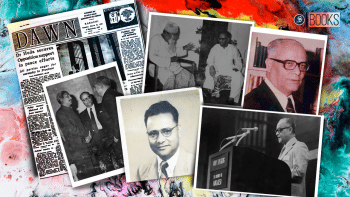
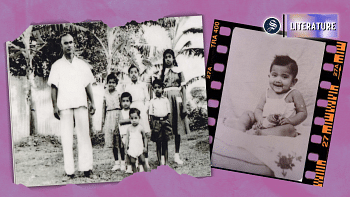
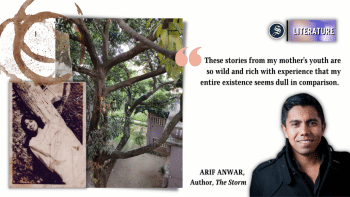


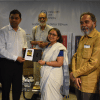
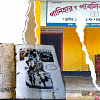





Comments